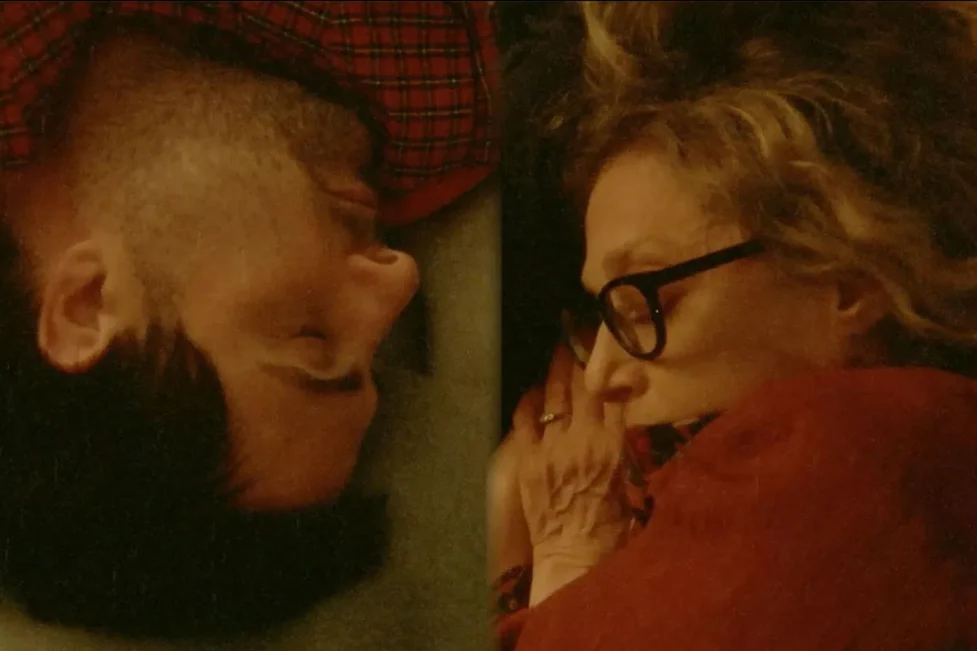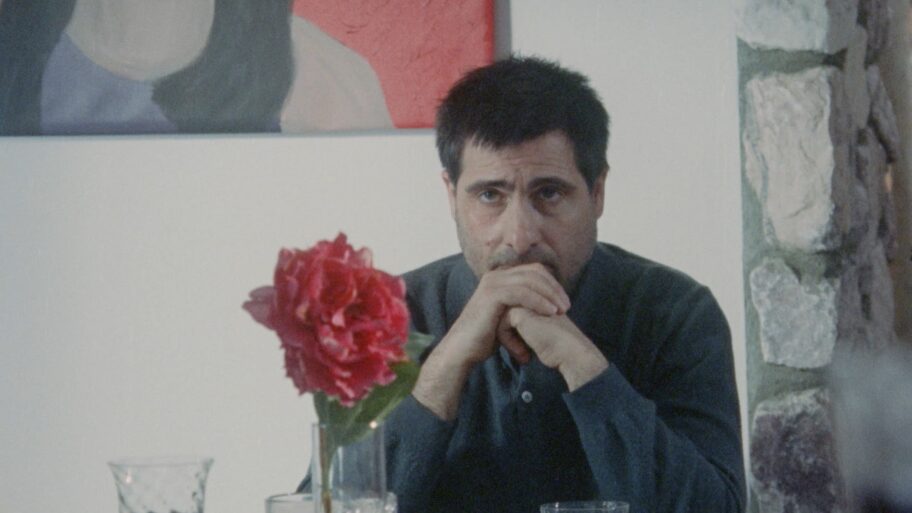Between the Temples was the summer’s feel-good movie—assuming a film about a widowed, depressed cantor (Jason Schwartzman) who has lost his voice and who falls in love with his elderly bat mitzvah student (Carol Kane) is the kind of movie that makes you feel good. It reminded me—as it reminds everyone—of Harold and Maude, but with less sex and more Judaism.
Released at a time when some Jewish artists are concerned about antipathy toward their work—a spillover from the Israel/Gaza war—the film was directed by Nathan Silver and co-written by him and C. Mason Wells. I spoke with the Jewish of the pair (can you guess which one that is?).
Mark Oppenheimer: The title, Between the Temples. What does it mean?
Nathan Silver: Well, it was a title that was kicking around my co-writer’s head, Chris Wells, for a while. And he was like, “Oh, this would be great for a Jewish comedy. You know, the idea of the temples, obviously on your forehead, and also the synagogues that some Jews fall between [when] they can’t find what they’re looking for in the actual building.”
MO: There’s a third meaning I’m thinking of, but I’m guessing this wasn’t part of the thought process. In ancient Israel there were two temples—there was a first temple and a second temple …
NS: It’s not part of the thinking, no…. But maybe the thought occurred before, like it was something that was just embedded!
MO: So how did you come up with the idea for the movie?
NS: I was shooting a documentary about my mom, Cindy Silver, this doc called Cutting My Mother, because she’d been in all my earlier movies, and then I cut her out of one movie, and she wouldn’t forgive me. So to make it up to her, I decided to shoot this doc about her and our relationship and working together and so on and so forth. And while I was following her around, we went to her temple, and I discovered that she was in a b’nai mitzvah class. I was kind of shocked, because she’d grown up in a very secular, socialist household. She’d never been to temple as a kid. Her family was culturally Jewish. We would, you know, do Hanukkah and Passover. But beyond that, religion, Judaism, for me was comedy. It was, you know, like Mel Brooks, Albert Brooks, Woody Allen, Seinfeld and so on.
But my producer and friend Adam Kersh immediately said, “There’s a movie there.” And I was like, “What’s the movie?” And he’s like, “Well, it’s like a riff on Harold and Maude. It’s like, you know, this late-in-life bat mitzvah student falls for her younger cantor or rabbi.”
And I looked at him, and I was like: “That’s not a movie. I don’t know what that is.” This was back in 2018. And he was really persistent about it and eventually [got] development money for it. I didn’t know what to do with the story, but I needed to pay rent. So I was like, “Okay, I’ll take this on.” And then I enlisted the help of my good friend and collaborator, Chris Wells, C. Mason Wells. He’s a Goy, not Jewish …
MO: “C. Mason Wells” is like straight out of central goy casting.
NS: Right! And he doesn’t like Harold and Maude all that much. He thinks it would be more interesting if if they hadn’t consummated the relationship in the movie—which is the movie that we would end up making. So it was kind of bringing him into this to have a more critical eye, and we just started looking at all these other movies around that time, like The Graduate before it, and then The Heartbreak Kid, which was basically a reaction to The Graduate in some ways. And then we started looking into screwball comedies—like, the spine of a screwball comedy of an uptight person being loosened up by a freer spirit, like Bringing Up Baby.
MO: I just watched The Heartbreak Kid for the first time. Do we know that it was meant as a reaction to The Graduate?
NS: There’s been a lot of speculation. I don’t know if it was ever said …
MO: But, you know, I was born in 1974, so I have all these old pictures of me wearing those orange and brown parkas from that era, and there were station wagons in the background. Are we in a good moment for that?
NS: I think we’re looking to a time when there was feeling. Like, I was born in 1983, and I do remember that growing up, everything had more texture.
MO: And it was on film. [Now, in high-definition TV,] when Grey’s Anatomy or ER is on, and the actors—you can see their pores and their zits and everything. And it freaks me out. I hate it.
That’s not how we see people.
NS: Right. We’re not attuned to their pores.
MO: Can we talk a little bit about the funding of this film? You’re pretty high up in the game at this point. You’re a serious indie film director. Your calls get returned. But I’m assuming you’re not rich.
NS: No, not at all. I mean, if anything, I’m the opposite of that. I’m in extreme debt, but I think that that’s the only way to get these movies made. I make a living off of writing scripts, setting up multiple projects at the same time and getting development money…. I’ve lived by the words “faith in the absurd” ever since I was like a teenager and read Kierkegaard, so I’ve always had this faith in the absurd that it will work out one day. I have to believe that there will be money in my bank account.
MO: Yeah, you’re just absurd and stupid enough to believe it.
NS: Exactly.
MO: It sounds like you and I had very similar upbringings, the sort of the socialist parents with the happy Jewish ritual twice a year, for Passover and Hanukkah or something. And then your mom joins a temple! My dad joined a temple at age 75 or something. I think he has since de -joined, but it was a very similar story. And I’m curious—I have my own narrative about how that shaped me with regard to Judaism—but before entering into this movie, what was your relationship to Judaism?
NS: Yeah, that’s a very good question. I guess it boiled down to finding the humor and everything—that life is absurd. Because it’s a religion about the absurdity we find in life that we embrace and have to deal with. So that was my take on it. And then as we went further into researching this movie, we spoke to a rabbi for a lot of the scripting phase, and then we had a Jewish consultant throughout prep and the shoot, who was a co -producer on the movie. And when he is not producing, he tutors kids for their bat mitzvahs!
MO: How many bar and bat mitzvah scenes have there been in movies?
NS: I feel like there has been a spate lately, like there’s that Adam Sandler movie on Netflix, You Are So Not Invited to My Bat Mitzvah. There’s a movie that we looked up called The Bar Mitzvah Boy, a British movie we didn’t track down—that was more of a drama.
MO: Did you know before you found out your mom was in an adult b’nai mitzvah class that that was a thing?
NS: No, I had no idea. I was like, “You’re not thirteen!” But it’s a thing now because, you know, back in the 1960s, when my mom would have gotten hers, the temple wasn’t really doing it.
MO: This is a weird moment politically. Do you think what’s going on in Israel and Gaza has in any way affected the reception of the movie?
NS: People keep asking about if there’s been a lot of antisemitic backlash against the movie. What I see is that what is forgotten about Judaism is the principle of questioning everything.
That’s Talmudic scholarship. It’s people just arguing over the truth or what a thing means. So I feel like that impulse to make people question what’s happening in the world is all for the better. We need to be questioning things at all times. We should not have a rigid outlook on the world. We have to be Talmudic scholars of life.

MO: I know in publishing there is a strong perception on the part of writers or agents that it’s harder to sell what’s perceived as “Jewish” content—because it’s perceived as white content, because it’s perceived as upper-middle-class content. Nobody said your movie would be tough to market, a movie about presumably white, upstate New York people?
NS: Two of our producers are BIPOC, and they never—it was never a question amongst the producers if this was going to be a hard sell. Because they believed in what the story was, and what the actors brought to it. After spending any time with Jason and Carol together, you could see the screwball comedy emerging. And Sony, they adored it, and decided to take a risk.
MO: It seems to me, based on the few lines of Torah he attempted to chant, that Jason Schwartzman can’t actually sing.
NS: He can sing beautifully! He was playing it up for the character.
MO: I got the whole movie entirely wrong then. Final question: What’s a movie I probably haven’t seen, an underappreciated movie that I should go check out?
NS: The Plot Against Harry. Have you seen that? Michael Roemer movie. Incredible Jewish movie—the Jewish movie of like, “If you’re going to watch one, this is the one you’ve got to watch.” And I’ve watched a lot. And you won’t be the same after it.
MO: Wow.
NS: It’s a miracle of a movie, and I don’t know why it’s not more widely celebrated.

